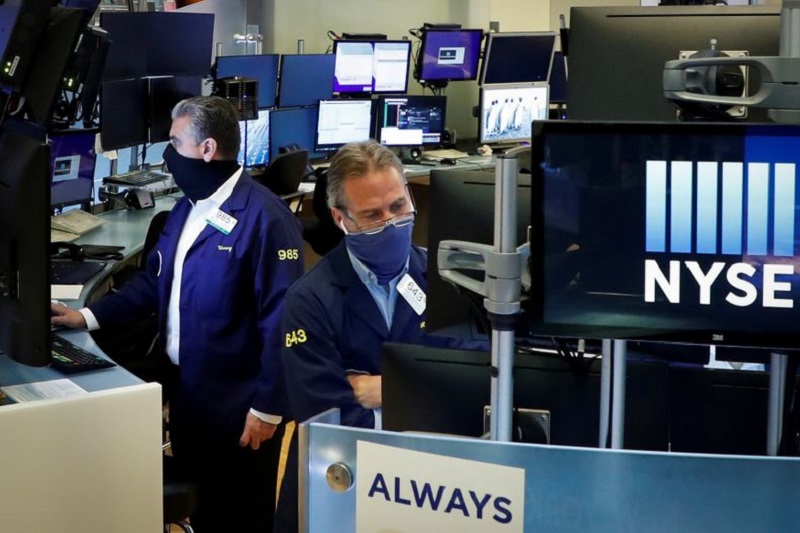Gold prices add to record high amid fiscal, tariff concerns
By Geoffrey Smith
Investing.com -- The global risk rally takes a breather as stocks and commodities around the world sell off. The dollar is rebounding and 10-year bond yields are only just below 1.50%. Stocks are set to resume their slide. The House of Representatives will vote on the $1.9 trillion stimulus package later Friday, but the proposal for a $15 federal minimum wage has been removed. Here’s what you need to know in financial markets on Friday, February 26th.
1. Global risk rally takes a breather
The furious rally in risk assets around the world is taking a well-earned breather on Friday, with emerging market FX, commodities and equities all following the U.S. lower in varying degrees after the spike in U.S. bond yields on Thursday.
The 10-Year bond yield itself is making an unconvincing recovery, having spiked as high as 1.60% in the wake of a weak Treasury bond auction on Thursday, where the ratio of bids to bonds on sale hit a record low. By 6:30 AM ET (1130 GMT), it was back at 1.48%, but that is still 18 basis points up on the week. The five-year yield, which is more sensitive to expected changes in Federal Reserve policy, has risen 22 basis points this week.
That has all galvanized the dollar. The dollar index rose 0.6% from late Thursday to trade at 90.71, its highest in over a week.
2. House votes on stimulus package; Dems’ minimum wage plan stymied
The U.S. Democratic Party’s attempts to implement a national minimum wage of $15 an hour are effectively dead.
A Senate official ruled on Thursday that the proposal – part of the $1.9 trillion stimulus package making its way through Congress – cannot be passed under Budget Reconciliation provisions, which would allow it to pass with a simple majority. The ruling leaves the provision open to filibusters from Senate Republicans.
The move is unlikely to stop the trend among big private employers from instituting higher minimum wages as they are forced to compete more for staff. Costco (NASDAQ:COST) CEO Craig Jelinek said on Thursday his company will raise starting pay to $16/hour - $1 more than the likes of Amazon (NASDAQ:AMZN) and Target (NYSE:TGT).
The House of Representatives will vote on President Biden’s relief package later in the day, according to House Majority Leader Steny Hoyer.
3. Stock sell-off set to resume; Airbnb outperforms after strong outlook
U.S. stocks are set to open lower again, with technology stocks still subject to the greatest selling pressure.
By 6:30 AM ET, Nasdaq 100 futures were down 74 points, or 0.6%, at their lowest in over three weeks. Dow Jones futures, which hit a new all-time high earlier this week, were down 159 points, or 0.5%, while S&P 500 futures were down 0.4%.
Stocks likely to be in focus later include Salesforce (NYSE:CRM), after a weaker-than-expected quarterly update late on Thursday, and AT&T (NYSE:T), which agreed to spin off its DirecTV unit.
Airbnb (NASDAQ:ABNB), having been hit hard by the broad tech sell-off, is set to bounce after it forecast strong growth in bookings this year, which outweighed a sharp IPO-related widening of its net loss in the fourth quarter.
4. ARKK outflows in focus on Tesla, Bitcoin woes
The five most broadly-held funds of Cathie Wood’s ARK family had another $500 billion in outflows on Thursday, according to Bloomberg data.
Wood has invested heavily in Tesla (NASDAQ:TSLA) and Bitcoin and a number of other tech-focused assets synonymous with the great rally of the last 12 months.
As such, her funds have become something of a barometer for the broader market enthusiasm for such names. Redemption pressure may continue Friday, with Bitcoin down another 8.8% overnight and Tesla down 3.1% in premarket after a report saying that it has become the latest carmaker forced to stop production due to the global shortage of semiconductors.
5. Crude eases from highs
Crude oil prices finally got shook out of their complacency, as the dollar snapped back and participants trimmed long positions ahead of next week’s OPEC+ meeting.
The meeting, due on Thursday, will have to set the group’s output level for April, amid a backdrop of rising speculation that Russia in particular will push for the taps to be reopened in style.
By 6:45 AM ET, U.S. crude futures were down 2.2% at $62.15 a barrel, while Brent was down 2.0% at $64.79 a barrel.
Baker Hughes rig count and CFTC positioning data round off the week later, after the latest quarterly update on personal consumer expenditures and the Chicago PMI.
